Shutdown inches closer as U.S. House GOP fails to pass defense bill, lawmakers exit D.C.
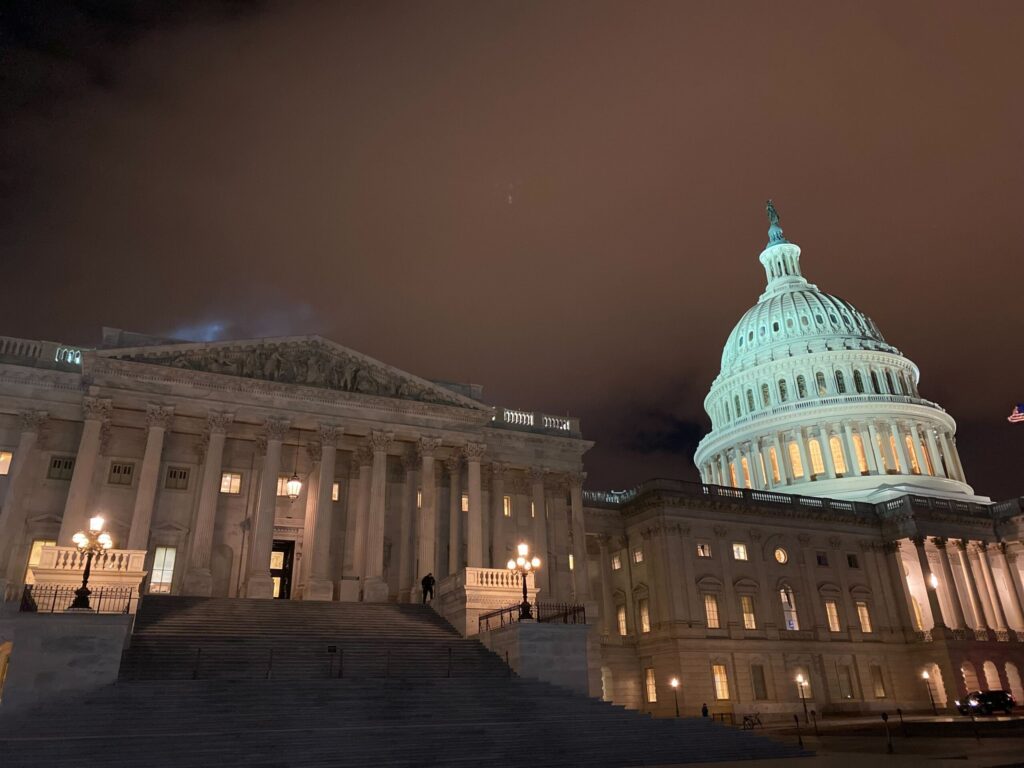
by Jennifer Shutt, Alabama Reflector September 21, 2023 WASHINGTON — U.S. House Republicans were unable for a third time Thursday to begin debate on the Defense funding bill, throwing another wrench into Speaker Kevin McCarthy’s leadership tenure. The 212-216 vote that rejected the rule for the $826 billion Defense spending measure was unexpected, coming less than a day after House GOP lawmakers gathered in a room in the Capitol basement to broker a path forward. Arizona Rep. Eli Crane and Georgia Rep. Marjorie Taylor Greene switched their votes to oppose the rule, after voting on Tuesday to adopt it. Colorado Rep. Ken Buck and South Carolina Rep. Ralph Norman both supported adoption of the rule on Thursday after opposing it earlier in the week. Other Republicans voting no included Andy Biggs of Arizona, Dan Bishop of North Carolina, and Matt Rosendale of Montana. The rule would have allowed the House to begin officially debating the bill and voting on nearly 200 amendments. The failed vote led McCarthy to reverse course on the schedule, with many lawmakers heading home for the weekend on Thursday instead of sticking around for votes throughout the weekend. McCarthy had said exactly one week ago, “When we come back, we’re not going to leave. We’re going to get this done.” The update to the House schedule sent around Thursday afternoon said ”ample notice will be given ahead of any potential votes tomorrow or this weekend.” The stalemate and change of plans does not bode well for efforts to approve the short-term spending bill that’s needed to stave off a partial government shutdown when the new fiscal year begins Oct. 1. McCarthy has yet to unify his members amid deep disagreements about how much the federal government should spend and what policy restrictions should be included in full-year bills as well as the stopgap measure. The ongoing dispute has ground the House chamber to a halt as McCarthy searches for a way to unify his razor-thin majority without turning to Democrats to pass a bipartisan bill. Arkansas Republican Rep. Steve Womack, a senior appropriator, said Thursday that his fellow lawmakers need to accept the Senate will re-work any partisan bills the House sends over. “Remember, this is all going to go to the Senate, so people don’t need to get real hot and bothered over where we are today,” Womack said. “It’s going to be based on what comes back and whether or not it can get to the floor.” Discussions among House Republicans, he said, are likely to become “heated” once the Senate re-works a short-term spending bill and sends it back to the House for a final approval vote. Infighting and political differences within the House Republican Conference have so far prevented GOP lawmakers from reaching agreement on their opening offer on a short-term spending bill, which is also called a continuing resolution or CR. Defense spending bill falters Before the Thursday vote, McCarthy had been somewhat optimistic the House could finally approve the rule and begin debate on the full-year Defense spending measure. Greene wrote on X that she switched her vote “because they refused to take the war money for Ukraine out and put it in a separate bill.” The rule approved 184 amendments for floor debate and votes, including one from Florida’s Matt Gaetz that would have prohibited “security assistance for Ukraine.” Crane wrote on X on Thursday that he believes votes “on CRs, omnibus bills and raising the debt ceiling should never take place.” “I’m going to do whatever I can to change the way this place works,” he wrote. Oklahoma Republican Rep. Tom Cole, chair of the Rules Committee, switched his vote on Thursday to a no vote after voting yes a few minutes earlier. The procedural maneuver allows him to bring the rule back up for a vote at a later time. The whip count error appeared to be a surprise for Defense Appropriations Chair Ken Calvert, a California Republican; ranking member Betty McCollum, a Minnesota Democrat; and staff — all of whom were seated at the tables on the House floor ready to lead debate on the measure. The Republican table held thick white binders as well as a large accordion folder, all filled with paperwork, and the Democratic table was stacked with paperwork as well. It’s highly unlikely that staff would have brought all the materials needed to debate the bill and amendments if they knew the rule vote was going to fail. ‘At least a short-term shutdown’ In addition to strong disagreement among House Republicans about the full-year spending bills, the House GOP Conference has yet to solidify a plan to pass the short-term stopgap spending bill that’s needed to hold off a funding lapse. Idaho Republican Rep. Mike Simpson, chair of the Interior-Environment spending subcommittee, said he expects there will be “at least a short-term shutdown” as the House and Senate try to reach agreement on a short-term spending bill. “That’s a lot of work to do in a very short time,” Simpson said. House Freedom Caucus Chair Scott Perry, a Pennsylvania Republican, said Thursday that he hasn’t seen details on any new short-term spending bills that might come to the floor. “I haven’t seen the language of any additional CR,” he said. Kansas Sen. Jerry Moran, the top Republican on the Commerce-Justice-Science spending panel, said he’s “hoping the House chaos is set aside.” “I keep saying I’m not voting for another CR again, but I keep voting for them because the outcome is worse with a shutdown,” Moran said. “But this just needs to be resolved in the House. I don’t think there’s a problem in the Senate that would cause a shutdown.” Any short-term spending bill will have to be bipartisan in order to get through the Democratically controlled Senate, where at least 60 votes are needed to limit debate on legislation. That could take more time than lawmakers have before Oct. 1, he said. “Nothing about this is conducive to getting
House Republicans amend the NDAA addressing Tommy Tuberville’s concerns
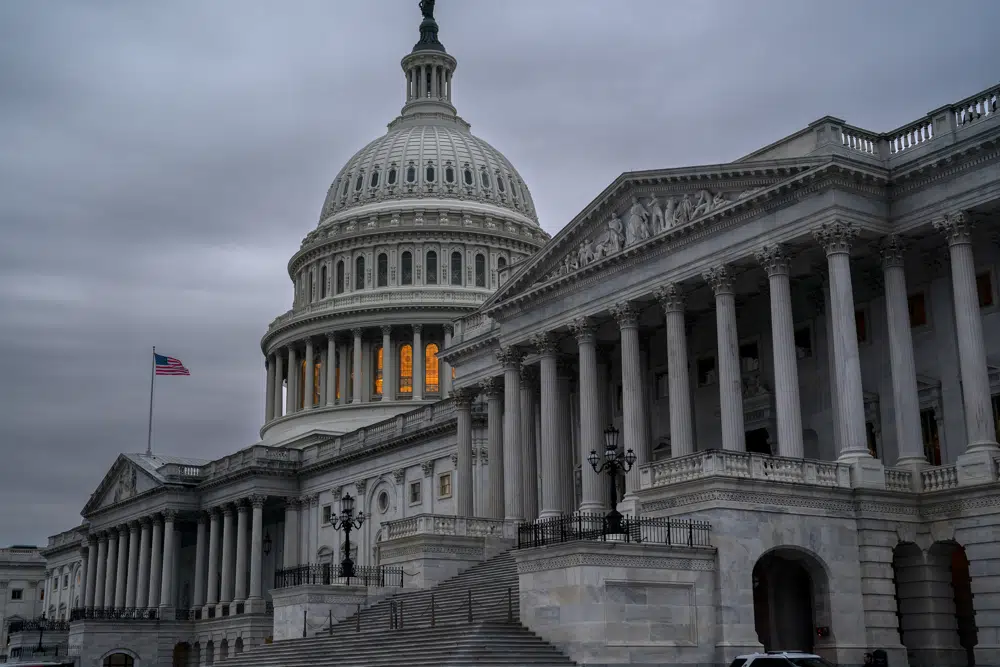
On Thursday, Congressional Republicans added several partisan amendments to the 2024 National Defense Authorization Act, including one overturning the DoD policy on abortions. The amended NDAA passed the U.S. House of Representatives on Friday. President Joe Biden said it is “irresponsible” for U.S. Senator Tommy Tuberville to block the confirmation of military officers in protest of a Defense Department policy that pays for travel for service members and their dependents to go out of state to get an abortion in state’s that have banned or restricted elective abortions. “He’s jeopardizing U.S. security by what he’s doing,” Biden said of Sen. Tommy Tuberville. “It’s just totally irresponsible, in my view.” Biden had demanded that Republicans address the Tuberville issue. “I expect the Republican Party to stand up — stand up and do something about it,” Biden continued. “The idea that we don’t have a chairman of the Joint Chiefs of Staff, the idea that we have all these promotions that are in abeyance right now and we don’t know what’s going to happen, the idea they were injecting into fundamental foreign policy decisions what in fact is a domestic social debate on social issues, is bizarre. I don’t ever recall it happening, ever. And it’s just totally irresponsible, in my view.” “I’m confident that the mainstream Republican Party no longer, does not support what he’s doing, but they got to stand up and be counted,” Biden said. “That’s how it ends.” House Republicans responded Thursday by amending the NDAA on the House floor. The House passed an amendment by Rep. Ronny Jackson (R-Texas) prohibiting the Secretary of Defense from paying for or reimbursing expenses relating to abortion services 221 – 213. Only two Republicans voted against including Jackson’s abortion amendment. The House also passed several other GOP priorities. The House passed an amendment by Rep. Matt Rosendale (R-Montana) that prohibits TRICARE from covering and the Department of Defense from furnishing sex reassignment surgeries and gender hormone treatments for transgender individuals 222 – 211. The House passed an amendment by Rep. Ralph Norman (R-South Carolina) prohibiting the provision of gender transition procedures, including surgery or medication, through the Exceptional Family Member Program 222 to 210. The House passed an amendment to prohibit federal funds from being used to establish a position within the Department of Defense for anything similar to Chief Diversity Officers or Senior Advisors for Diversity and Inclusion 217 – 212. The House passed an amendment by Rep. Lauren Boebert (R-Colorado) prohibiting the Department of Defense Education Activity schools from purchasing and having pornographic and radical gender ideology books in their libraries. The House passed an amendment by Rep. Warren Davidson (R-Ohio) that requires a study and report on health conditions arising in members of the Armed Forces after the administration of the COVID-19 vaccine by a voice vote. Rep. Boebert proposed an amendment prohibiting Defense Department schools from having “pornographic and radical gender ideology books in their libraries.” That passed 222-209. Rep. Norman’s amendment to ban Diversity, Equity, and Inclusion within the Department of Defense was narrowly adopted 214-213 on the second vote. An amendment from Rep. Eli Crane (R-Arizona) prohibiting the Pentagon from requiring training in certain “race-based concepts” was adopted 214-210. Not all amendments passed. A series of five proposals to limit U.S. involvement in Ukraine failed. An amendment from Rep. Matt Gaetz (R-Florida) to prohibit using federal funds for training on diversity, equity, and inclusion was rejected Thursday in a 210-221 vote. The House rejected an amendment from Reps. Davidson and Chip Roy (R-Texas) that “expresses a sense of Congress that the U.S. should not continue subsidizing NATO member countries who choose not to invest in their own defense by meeting” established financial contribution targets. The vote was 212-218, with two Democrats voting to support the measure and eight Republicans voting against it. An amendment to prohibit the transfer of cluster munitions to Ukraine was rejected 147-276-2. 98 Republicans and 49 Democrats voted in favor, and 121 Republicans and 155 Democrats voted against. The House rejected an amendment prohibiting using federal funds to rename military bases. The Republican changes to the NDAA meant that it lost Democratic support in the final vote. Democrats denounced the amendment as a cruel, harmful amendment to roll back a DoD policy helping service women travel to get the reproductive health care they need, putting the health and lives of over 230,000 women in uniform at risk. Democrats also denounced amendments that strip medically-necessary care for LGBTQ+ service members. Congresswoman Terri Sewell (D-AL07) voted against the NDAA due to the Republican changes on the floor. “For the past 62 years, Republicans and Democrats have come together to craft bipartisan defense authorization bills that would support our troops and strengthen our national security,” said Rep. Sewell. “But this year, rather than continuing that essential tradition, Speaker [Kevin] McCarthy has caved to the most extreme members of his party and allowed the radical right wing to poison the defense bill with culture war provisions that would undermine our military readiness and harm our service members.” “I did not take this vote lightly,” continued Sewell. “I have proudly voted in favor of the annual defense bill every year since coming to Congress. But I cannot and will not support a bill that would rip basic health care away from our service members and make bigotry and discrimination a centerpiece of our defense policy. Republicans need to stop playing politics with our national security.” The NDAA authorizes funding levels for the Department of Defense (DoD) and allows the Armed Forces to pay, train, and equip U.S. service members, support America’s allies worldwide, and carry out essential national security operations. House Minority Leader Hakeem Jeffries (D-New York), Minority Whip Katherine Clark (D-Massachusetts), and Democratic Caucus Chair Pete Aguilar (D-California) released a joint statement after the chamber approved a number of conservative amendments to the NDAA. “Extreme MAGA Republicans have chosen to hijack the historically bipartisan National Defense Authorization Act to continue attacking reproductive freedom and jamming their right-wing ideology down the throats of the American people,” the Democratic trio wrote in a joint statement. To connect with the author of this story or to comment, email brandonmreporter@gmail.com
House Republicans pass U.S. debt bill, push Joe Biden on spending
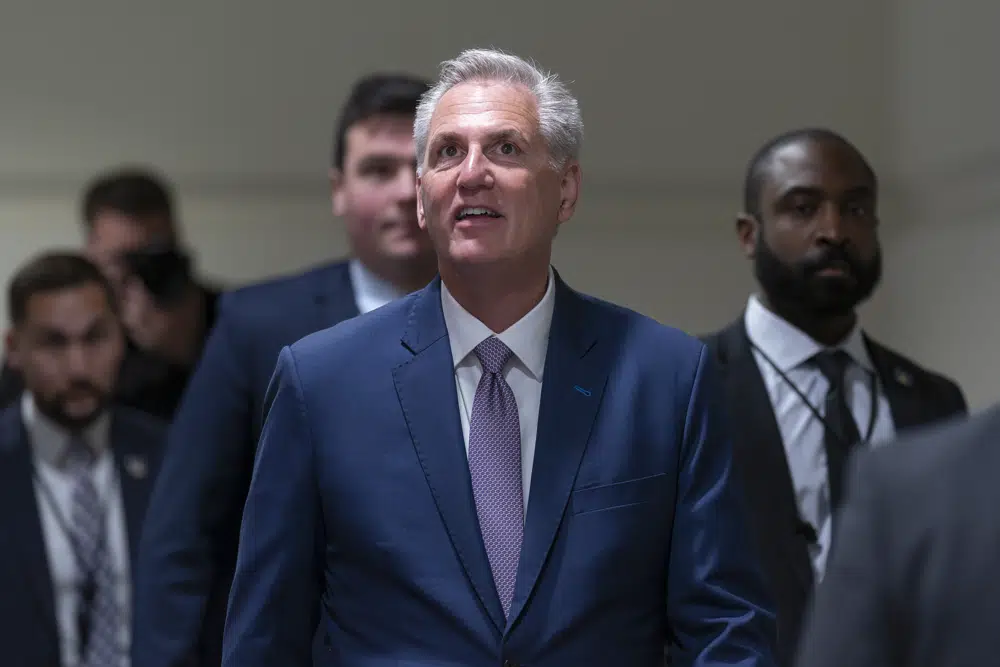
House Republicans narrowly passed sweeping legislation Wednesday that would raise the government’s legal debt ceiling by $1.5 trillion in exchange for steep spending restrictions, a tactical victory for Speaker Kevin McCarthy as he challenges President Joe Biden to negotiate and prevent a catastrophic federal default this summer. Biden has threatened to veto the Republican package, which has almost no chance of passing the Democratic Senate in the meantime, and the president has so far refused to negotiate over the debt ceiling, which the White House insists must be lifted with no strings to ensure America pays its bills. But McCarthy’s ability to swiftly unite his slim majority and bring the measure to passage over opposition from Democrats and even holdouts in his own party gives currency to the Republican speaker’s strategy to use the vote as an opening bid forcing Biden into talks. The two men could hardly be further apart on how to resolve the issue. The bill passed by a razor-thin 217-215 margin. “We’ve done our job,” McCarthy said after the vote. “The president can no longer ignore” the issue by not negotiating with the House Republicans, he declared. As the House debated the measure, Biden on Wednesday indicated he was willing to open the door to talks with McCarthy, but not on preventing a first-ever U.S. default that would shake America’s economy and beyond. “Happy to meet with McCarthy, but not on whether or not the debt limit gets extended,” Biden said. “That’s not negotiable.” Passage of the sprawling 320-page package in the House is only the start of what is expected to become a weekslong political slog as the president and Congress try to work out a compromise that would allow the nation’s debt, now at $31 trillion, to be lifted to allow further borrowing and stave off a fiscal crisis. The nation has never defaulted on its debt, and the House Republican majority hopes to maneuver Biden into a corner with its plan to roll back federal spending to fiscal 2022 levels and cap future spending increases at 1% over the next decade, among other changes. McCarthy worked nonstop to unite his fractious Republican majority, the “five families,” including the conservative Freedom Caucus and others, making post-midnight changes in the House Rules Committee in the crush to win over holdouts. Facing a revolt from Midwestern Republicans over doing away with biofuel tax credits that were just signed into law last year by Democrat Biden, GOP House members relented and allowed the tax credits to stay on the books in their bill. “Our delegation has stood united for Iowa’s farmers and producers fighting to amend the bill to protect biofuels tax credits,” said the four House Republicans from Iowa in a joint statement announcing their support for the bill. Republicans also agreed to more quickly launch the bolstered work requirements for recipients of government aid, starting in 2024 as proposed by another holdout, Freedom Caucus’ Rep. Matt Gaetz, R-Fla., who has led previous challenges to McCarthy. Republicans hold a five-seat House majority and faced several absences this week, leaving McCarthy with almost no votes to spare. In the end the speaker lost four Republican no votes, and all Democrats opposed. “This bill is unacceptable, it’s unreasonable, it’s unworkable, it’s unconscionable — and it’s un-American,” said the Democratic leader Hakeem Jeffries of New York. “That’s why we oppose it.” Democrats derided the Republican plan as a “ransom note,” a “shakedown,” and “an unserious bill” that was courting financial danger. But as McCarthy worked to shore up support, some of the most conservative rank-and-file Republican members who have never voted for a debt ceiling increase in their quest to slash spending said they were preparing to do just that, rallying behind the speaker’s strategy to push Biden to the negotiating table. Rep. Ralph Norman, R-S.C., a member of the Freedom Caucus, said he “wanted double” the deficit savings contained in the bill but would vote for it “because it starts the ball, it gets us in the arena to solve the debt problem.” It’s a first big test for the president and the Republican speaker, coming at a time of increased political anxiety about the ability of Washington to solve big problems amid the need to raise the federal debt limit in a matter of weeks. The Treasury Department is taking “extraordinary measures” to pay the bills, but funding is expected to run out this summer. Economists warn that even the serious threat of a federal debt default would send shockwaves through the economy. In exchange for raising the debt limit by $1.5 trillion into 2024, the bill would roll back overall federal spending and: — Claw back unspent COVID-19 funds. — Impose tougher work requirements for recipients of food stamps and other government aid. — Halt Biden’s plans to forgive up to $20,000 in student loans and — End many of the landmark renewable energy tax breaks Biden signed into law last year. It would tack on a sweeping Republican bill to boost oil, gas, and coal production. A nonpartisan Congressional Budget Office analysis estimated the Republican plan would reduce federal deficits by $4.8 trillion over the decade if the proposed changes were enacted into law. Several Republicans from the party’s right-wing, eager for even stricter spending cuts, said the bill was at least a starting point as they prepared to vote for McCarthy’s strategy and bolster his hand in talks with Biden. Freshman Rep. Derrick Van Orden, R-Wis., said: “It’s our obligation to get Speaker McCarthy to the table.” Others, though, remained noncommittal or flat-out no’s. Rep. Andy Biggs, the former chairman of the Freedom Caucus, said he had wanted Republicans to do more to end deficit spending. Tim Burchett, R-Tenn., said of the nation’s nearly $32 trillion in debt, “That’s my major concern.” In the Senate, leaders were watching and waiting. Senate Majority Leader Chuck Schumer said House passage of the legislation would be a “wasted effort” and that McCarthy should come to the table with Democrats to pass a straightforward debt-limit bill without GOP priorities
Bipartisan congressional caucus forms to address fentanyl crisis
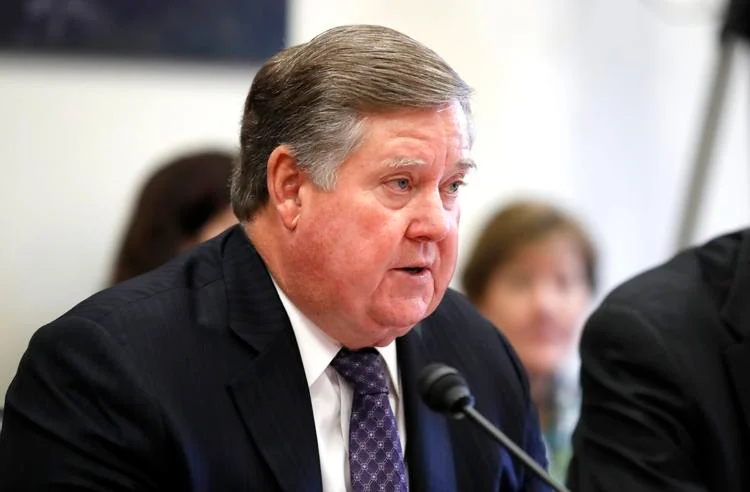
Labeling the smuggling of illicit fentanyl into the U.S. from Mexico “a national crisis,” a group of lawmakers has formed a bipartisan caucus to address the issue. Led by Republican California Reps. Ken Calvert and Darrell Issa and Democratic Reps. Joe Neguse of Colorado and Madeleine Dean of Pennsylvania, the Bipartisan Fentanyl Prevention Caucus was formed to “coordinate with members from both sides of the aisle to combat the nationwide spike in fentanyl-related overdoses and drug poisonings.” The group says it will work with federal and state law enforcement and “to educate the public and the Congress, in cooperation with prevention and awareness groups to better understand the ongoing threat of fentanyl in communities across America.” “Fentanyl is devastating the lives of Americans in every corner of our country. With fentanyl-related deaths climbing every year, we need new solutions to stop this alarming trend,” Calvert said. “This is not a partisan issue – it’s a national crisis.” Rather than pledging to end the fentanyl crisis, Calvert said he hoped the caucus would “educate Americans on the dangers of fentanyl and provide real solutions that will stop the destruction of this deadly drug.” “Fentanyl is not a new danger. But the deadly threat it poses has now reached every corner of our country, and no community is being spared,” Issa said. “The stakes could not be more clear: If we don’t win the fentanyl fight, we’re not going to just lose my community or my neighbor’s. Or any one of my colleagues. We’re going to lose this country. This caucus is needed now as we tell the truth, develop solutions, and save lives.” When announcing its formation, the caucus didn’t call on the president or Secretary of State Antony Blinken to declare Mexican cartels as Foreign Terrorist Organizations, as Texas Gov. Greg Abbott and 21 attorneys general have repeatedly done. Last September, Abbott issued an executive order designating the Sinaloa Cartel, the Jalisco New Generation Cartel, and any similarly situated Mexican drug cartels as foreign terrorist organizations” under Section 219 of the Immigration and Nationality Act. He also requested President Joe Biden do likewise, the second time he’d made the request since April 2021. In his September 21, 2022 letter, Abbott said since then, “There was no action, no response.” He’s still received no response, his office has told The Center Square. Last week, Blinken told Congress he’d consider designating cartels as FTOs. Two weeks prior, the White House said it didn’t have any intention of doing so. Republican U.S. Sens. Rick Scott of Florida and Roger Marshall of Kansas introduced the Drug Cartel Terrorist Designation Act, which Florida Attorney General Ashley Moody said will “do the job Biden refuses to do – protect the American people.” The caucus also hasn’t demanded the president designate fentanyl as a weapon of mass destruction, as 18 attorneys general have done led by Moody. Fentanyl poisoning remains the leading cause of death among adults between the ages of 18 and 45. Two milligrams, the weight of a mosquito, is lethal. In fiscal years 2021 and 2022, CBP agents confiscated enough fentanyl to kill nearly 5 billion people. Since March 2021, Texas Operation Lone Star officers have seized over 373 million lethal doses of fentanyl. Florida law enforcement officers in a few month’s time last year seized enough fentanyl to kill everyone in Florida. The U.S. Drug Enforcement Administration has issued several public alerts warning Americans about the dangers of fentanyl. Most recently it issued another public alert about the “sharp increase in the trafficking of fentanyl mixed with Xylazine,” an animal tranquilizer referred to on the streets as “Tranq.” It did so after the FDA, CDC, and multiple state agencies issued warnings about Xyzaline being detected in an increasing number of illicit drug mixtures and a growing number of overdose deaths nationwide. “Xylazine is making the deadliest drug threat our country has ever faced, fentanyl, even deadlier,” DEA Administrator Anne Milgram said. DEA has so far seized Xylazine and fentanyl mixtures in 48 of 50 states. Caucus members also include Angie Craig (D-MN), Chris Pappas (D-NH), Raja Krishnamoorthi (D-IL), Melanie Stansbury (D-NM), Chrissy Houlahan (D-PA), Ruben Gallego (D-TX), Nikki Budzinski (D-IL), Marc Veasey (D-TX), Sheila Jackson Lee (D-TX), Raúl Grijalva (D-AZ), Doug Lamborn (R-CO), Sharice Davids (D-KS), Don Bacon (R-NE), Claudia Tenney (R-NY), Andre Carson (D-IN), Ralph Norman (R-SC), Chris Smith (R-NJ), Lance Gooden (R-TX), Bob Latta (R-OH), Andy Biggs (R-AZ), Jake LaTurner (R-KS), Barry Moore (R-AL), David Valadao (R-CA), and Robert Aderholt (R-AL). Republished with the permission of The Center Square.
Barry Moore cosponsors resolution calling for end of Ukraine aid
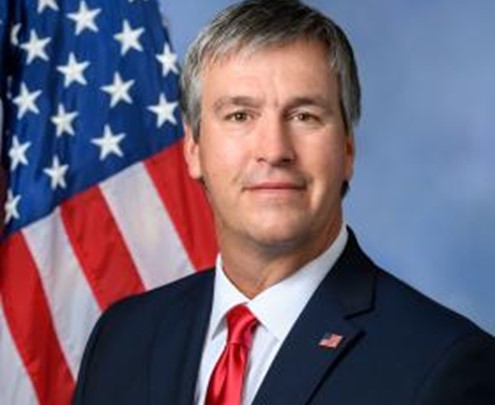
Congressman Barry Moore was one of ten cosponsors of a controversial Ukraine Fatigue resolution introduced by Congressman Matt Gaetz calling for an end to military and financial aid to Ukraine and calling for Ukraine and Russia to reach a peace deal ending the war. “The only person earning an easier buck than Ukrainian war profiteers is Hunter Biden’s art dealer,” said Rep. Moore on Twitter. Congress should support @RepMattGaetz’s resolution and end taxpayer-funded blank checks to Ukraine.” Moore was the only member of the Alabama delegation to join the resolution calling for an end to military aid for Ukraine – which is fighting off a massive invasion by Russia. The other nine cosponsors are Rep. Andy Biggs, Rep. Lauren Boebert, Rep. Paul Gosar, Rep. Marjorie Taylor Greene, Rep. Anna Paulina Luna, Rep. Thomas Massie, Rep. Mary Miller, Rep. Ralph Norman, and Rep. Matt Rosendale. “President Joe Biden must have forgotten his prediction from March 2022, suggesting that arming Ukraine with military equipment will escalate the conflict to ‘World War III,’” Rep. Gaetz said. “America is in a state of managed decline, and it will exacerbate if we continue to hemorrhage taxpayer dollars toward a foreign war. We must suspend all foreign aid for the War in Ukraine and demand that all combatants in this conflict reach a peace agreement immediately.” Moore has had a history of being skeptical of military aid for Ukraine. On January 20, Moore joined a letter led by Rep. Dan Bishop and Senator J.D. Vance to President Biden’s Office of Management and Budget (OMB) Director Shalanda Young demanding a “full crosscutting report” to Congress that includes “U.S. government-wide expenditures for Ukraine and ‘countries impacted by the situation in Ukraine’ since Feb. 24, 2022.” “With an ever-growing federal budget and national debt, Alabamians deserve to know how their tax dollars are being spent – or misspent – on a war between Ukraine and Russia,” said Moore. “I am proud to join Rep. Dan Bishop and Senator J.D. Vance to demand answers and transparency from the Biden administration on these huge outlays of American taxpayer dollars.” In the 117th Congress, Moore signed a resolution led by Rep. Marjorie Taylor Green requesting an audit of all American taxpayer dollars sent to Ukraine. “I was in Ukraine before Afghanistan fell, and at that point in time, the parliament was extremely concerned about [American] energy policy and how we were allowing Putin to basically move the [Nord Stream 2] Pipeline and start production,” Moore said in November. “Even then, parliament saw the issue, but when I got here and started talking to other members, the same group of people here gave Trump such a hard time about a few billion dollars at the U.S. southern border.” “As fentanyl and drugs and illegals poured across our southern border, a few billion dollars, four billion, was just a little too much money,” Moore continued. “And now we are looking at $40 billion one week, $14 billion the next week with little to no oversight. Ukraine is a young democracy, and we are sending American taxpayer money over there with no oversight. It creates problems, it creates corruption, it’s not good for the American taxpayer or the American people.” Gaetz and Moore’s position is not shared by even many Republicans. Congressman Mike Rogers, who chairs the powerful House Armed Services Committee, has been a vocal proponent of military aid for Ukraine. “Now is the time for the Biden and Scholz governments to follow the lead of our U.K. and Eastern European allies – Leopard 2 tanks, ATACMS, and other long-range precision munitions should be approved without delay,” Chairman Rogers said. The United States is providing Ukraine with over $100 billion in aid – including M1 Abrams main battle tanks, Lancer anti-tank missiles, Bradley infantry fighting vehicles, Stryker combat vehicles, Stinger surface-to-air missiles, Patriot surface-to-air missile systems, multiple rocket launch systems (MRLS), 155 mm Paladin self-propelled artillery systems, and other weapons. Ukrainian President Volodymyr Zelensky is now asking the United States and allies to provide Ukraine with modern jet fighters, including F16s. Zelensky has been meeting with European leaders this week and appears to be close to a deal with EU members on fighter jets. There is wide speculation that in the coming weeks that Russia will launch a massive new offensive in the war. Moore is in his second term representing Alabama’s Second Congressional District. To connect with the author of this story or to comment, email brandonmreporter@gmail.com.
Kevin McCarthy makes big gains for speaker, but still falls short
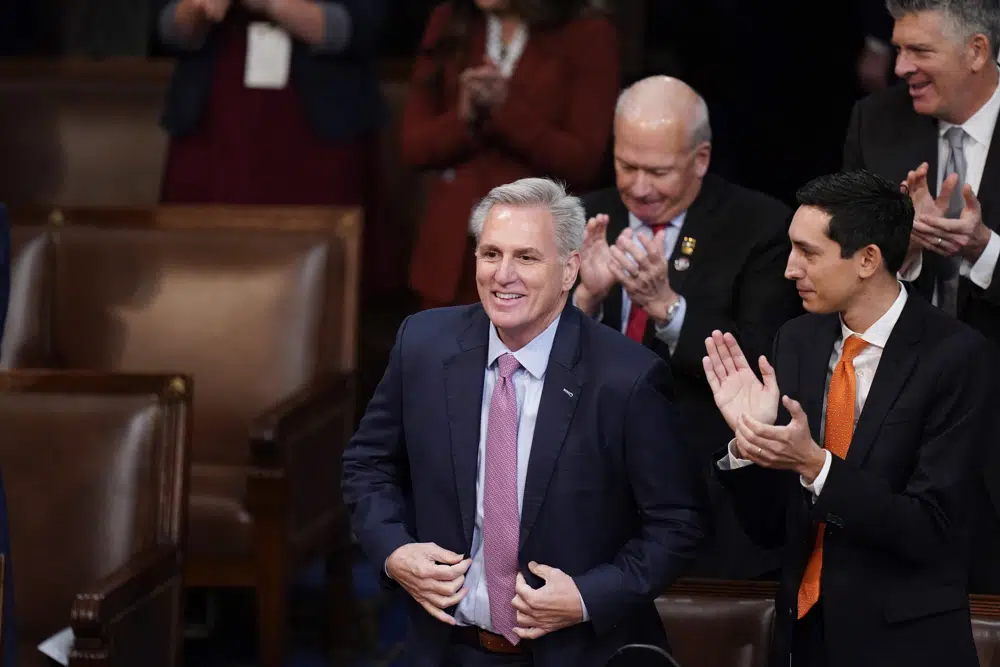
Republican leader Kevin McCarthy flipped 15 colleagues to support him in dramatic votes for House speaker on Friday, making extraordinary gains on the fourth day and the 12th and 13th ballots of a grueling standoff that was testing American democracy and the Republicans’ ability to govern. The changed votes from conservative holdouts, including the chairman of the chamber’s Freedom Caucus, put McCarthy closer to seizing the gavel for the new Congress — but not yet able. The stunning turnaround came after McCarthy agreed to many of the detractors’ demands — including the reinstatement of a longstanding House rule that would allow any single member to call a vote to oust him from office. That change and others mean the job he has fought so hard to gain will be weakened. After McCarthy won the most votes for the first time on the 12th ballot, a 13th was swiftly launched, this time just between McCarthy and the Democratic leader, with no nominated Republican challenger to siphon GOP votes away. But six GOP holdouts still cast their ballots for unnominated others, denying him the majority needed. The showdown that has stymied the new Congress came against the backdrop of the second anniversary of the January 6, 2021, attack on the Capitol, which shook the country when a mob of then-President Donald Trump’s supporters tried to stop Congress from certifying the Republican’s 2020 election defeat to Democrat Joe Biden. A few minutes before voting began in the House chamber, Republicans tiring of the spectacle walked out when one of McCarthy’s most ardent challengers railed against the GOP leader. “We do not trust Mr. McCarthy with power,” said Republican Matt Gaetz of Florida as colleagues streamed out of the chamber in protest of his remarks. Contours of a deal with conservative holdouts who have been blocking McCarthy’s rise emerged, but an agreement had seemed still out of reach after three dismal days and 11 failed votes in a political spectacle unseen in a century. But an upbeat McCarthy told reporters as he arrived at the Capitol Friday morning, “We’re going to make progress. We’re going to shock you.” One significant former holdout, Republican Scott Perry, chairman of the conservative Freedom Caucus, tweeted after his switched vote for McCarthy: “We’re at a turning point.” But several holdouts remained. The final 12th vote tally: McCarthy, 213 votes; Democrat Hakeem Jeffries 211. Other Republicans Jim Jordan and Kevin Hern picked up protest votes. With 431 members voting, McCarthy was still a few votes short of a majority. When Rep. Mike Garcia nominated McCarthy for a 12th time, he also thanked the U.S. Capitol Police who were given a standing ovation for protecting lawmakers and the legislative seat of democracy on January 6. The agreement McCarthy presented to the holdouts from the Freedom Caucus and others centers around rules changes they have been seeking for months. Those changes would shrink the power of the speaker’s office and give rank-and-file lawmakers more influence in drafting and passing legislation. Even if McCarthy is able to secure the votes he needs, he will emerge as a weakened speaker, having given away some powers, leaving him constantly under threat of being voted out by his detractors. But he would also be potentially emboldened as a survivor of one of the more brutal fights for the gavel in U.S. history. At the core of the emerging deal is the reinstatement of a House rule that would allow a single lawmaker to make a motion to “vacate the chair,” essentially calling a vote to oust the speaker. McCarthy had resisted allowing a return to the longstanding rule that former Speaker Nancy Pelosi had done away with, because it had been held over the head of past Republican Speaker John Boehner, chasing him to early retirement. But it appears he had no other choice. The chairman of the chamber’s Freedom Caucus, Scott Perry of Pennsylvania, who had been a leader in Trump’s efforts to challenge his presidential election loss to Democrat Joe Biden, appeared receptive to the proposed package, tweeting an adage from Ronald Reagan, “Trust but verify.” Other wins for the holdouts include provisions in the proposed deal to expand the number of seats available on the House Rules Committee, to mandate 72 hours for bills to be posted before votes, and to promise to try for a constitutional amendment that would impose federal limits on the number of terms a person could serve in the House and Senate. Lest hopes get ahead of reality, conservative holdout Ralph Norman of South Carolina said: “This is round one.” It could be the makings of a deal to end a standoff that has left the House unable to fully function. Members have not been sworn in, and almost no other business can happen. A memo sent out by the House’s chief administrative officer Thursday evening said that committees “shall only carry out core Constitutional responsibilities.” Payroll cannot be processed if the House isn’t functioning by January 13. After a long week of failed votes, Thursday’s tally was dismal: McCarthy lost seventh, eighth, and then historic ninth, 10th, and 11th rounds of voting, surpassing the number from 100 years ago in the last drawn-out fight to choose a speaker. The California Republican exited the chamber and quipped about the moment: “Apparently, I like to make history.” Feelings of boredom, desperation, and annoyance seemed increasingly evident. Democrats said it was time to get serious. “This sacred House of Representatives needs a leader,” said Democrat Joe Neguse of Colorado, nominating his own party’s leader, Hakeem Jeffries, as speaker. What started as a political novelty, the first time since 1923 a nominee had not won the gavel on the first vote, has devolved into a bitter Republican Party feud and deepening potential crisis. Democratic leader Jeffries of New York won the most votes on every ballot but also remained short of a majority. McCarthy ran second, gaining no ground. Pressure has grown with each passing day for McCarthy to somehow find the votes he needs or
Robert Aderholt supports protecting pharmacists’ First Amendment rights regarding prescriptions for elective abortions

Congressman Robert Aderholt announced that he has become a co-sponsor of a bill to protect the First Amendment rights of pharmacists when choosing whether or not to fill prescriptions for elective abortions. The Pharmacist Conscience Protection Act H.R. 8820 was introduced by Rep. Earl L. “Buddy” Carter (R-Georgia), Diana Hashbarger (R-Tennessee), and Blake Moore (R-Utah). Reps. Carter and Harshbarger are both pharmacists. It is co-sponsored by 26 House Republicans. The legislation comes after the Department of Health and Human Services (HHS) issued guidance warning pharmacists that they could be in violation of federal civil rights laws if they do not fill such prescriptions. “Pharmacists should not be forced to surrender their First Amendment rights of religious freedom because of radical policies from the Biden Administration,” said Congressman Aderholt. “It’s unfortunate that we need conscience protections like these, but it’s the only way to keep the overbearing Biden Administration from forcing private citizens to violate strongly held convictions.” “Your first amendment rights don’t go away when you put on a white coat,” said Rep. Carter. “This legislation will ensure that pharmacists are able to make the medical decisions that are best for the health of the mother, the life of the child, and the integrity of their practice without threats from non-medically trained bureaucrats. Medical decisions should be made between doctors, pharmacists, and patients – not the federal government.” “I will not stand by and let the Biden administration use an extremist and unlawful agenda of taxpayer-funded abortions through birth to persecute pharmacists who have religious, moral, or conscience objections to the intentional killing of unborn children through abortion,” stated Rep. Harshbarger. “As a licensed pharmacist for more than 30 years, I have always followed the precept of first doing no harm. I will always stand up for the lives of unborn children and will always defend health practitioners who believe the same. Pharmacists and other health professionals should never be punished for their moral beliefs in protecting life, or be threatened or forced to facilitate abortions against such beliefs. I call on the Biden administration to immediately withdraw this outrageous assault on pharmacists’ conscience rights, and to stop treating the Constitution like its own political chew-toy!” “Conscience protections prevent discrimination and ensure Americans in the healthcare sector are not forced to violate their beliefs,” said Rep. Moore. “As the Biden Administration takes steps to undermine the conscience rights of pharmacists, I am proud to join Congressman Buddy Carter and Congresswoman Diana Harshbarger in introducing the Pharmacist Conscience Protection Act which would ensure pharmacists can refuse to provide abortion drugs without repercussion. Pharmacists, along with other medical and healthcare workers, should never be coerced into participating in abortions, and this bill is an important step in supporting medical professionals who have deep convictions about practicing life-affirming medicine.” The text reads in part, “In General.—Notwithstanding any other provision of law, the Federal Government, and any person or entity that receives Federal grants, contracts, or financial assistance, including any State or local government, may not penalize, treat adversely, retaliate against, or otherwise discriminate against a specified health care provider, or take any action that has such effect, on the basis that the specified health care provider does not or declines to store or fill a prescription, or make a referral, for a drug that is approved by the Food and Drug Administration to cause an abortion or that the specified health care provider in good faith believes may be used to cause an abortion.” Other co-sponsors are Reps. Chris Smith (R-NJ), Tracey Mann (R-KS), Doug Lamborn (R-CO), David McKinley (R-WV), Ken Buck (R-CO), Lance Gooden (R-TX), Jake Ellzey (R-TX), Kat Cammack (R-FL), Mary Miller (R-IL), Ralph Norman (R-SC), Bill Posey (R-FL), Greg Steube (R-FL), Troy Balderson (R-OH), Brian Babin (R-TX), Dan Webster (R-FL), Jeff Duncan (R-SC), Randy Weber (R-TX), Markwayne Mullin (R-OK), Brad Wenstrup (R-OH), Don Bacon (R-NE), Robert E. Latta (R-OH), and Andrew Clyde (R-GA). Aderholt is in his thirteenth term representing Alabama’s Fourth Congressional District. To connect with the author of this story, or to comment, email brandonmreporter@gmail.com.
Barry Moore joins lawsuit to end mask mandate for air travel

Representative Barry Moore has joined sixteen of his colleagues in a lawsuit against the Centers for Disease Control and Prevention (CDC). The lawsuit, Massie et al v. Centers for Disease Control and Prevention, seeks to end the CDC’s mask mandate for individuals traveling on commercial airlines. Reports indicate the Biden Administration is extending the CDC’s mask mandate until April 18. Massie et al. v. Centers for Disease Control and Prevention was filed in the United States District Court for the Western District of Kentucky. The named defendants are Centers for Disease Control and Prevention, Rochelle P. Walensky in her official capacity as Director of the CDC, and Sherri A. Berger in her official capacity as Chief of Staff of the CDC. The lawsuit contains two primary claims: First, none of the statutes or regulations cited by the CDC for the authority to mandate that individuals wear masks on commercial airlines, conveyances, and at transportation hubs, permit the CDC to implement or enforce this mandate. Second, even if Congress had granted the CDC the authority to promulgate the mask mandate, the granting of this authority would violate a principle known as the “non-delegation doctrine.” Moore and his co-plaintiffs are asking a federal court to declare that “the mask mandate is beyond the CDC’s statutory authority or is unconstitutional.” The plaintiffs are also seeking an injunction that prohibits the CDC, or anyone acting on the CDC’s behalf, from enforcing the mask mandate. Rep. Thomas Massie argued that the CDC doesn’t have the authority to force people to wear masks on airplanes because Congress never passed a law requiring it. “The Centers for Disease Control and Prevention does not have the legal authority to force people traveling on commercial airlines to wear masks,” stated Massie. “Congress never passed a law requiring masks on commercial flights. This lawsuit targets the faceless bureaucrats who are behind the CDC’s unscientific regulation so that this illegal mask mandate can be brought to a permanent end.” Moore argued that the mandate should end immediately because it infringes on constitutional freedoms. “Government bureaucrats desperate for relevancy are waging a war against everyday American citizens and their constitutional freedoms,” stated Rep. Moore. “The unscientific mask mandate for commercial air travel should be ended immediately, and I am proud to join my friend Rep. Massie in this lawsuit to end this charade permanently.” Additional plaintiffs for the lawsuit include Reps. Thomas Massie, Rand Paul, Andy Biggs, Dan Bishop, Lauren Boebert, Andrew Clyde, Warren Davidson, Bob Good, Paul Gosar, Marjorie Taylor Greene, Brian Mast, Alex Mooney, Ralph Norman, Bill Posey, Matt Rosendale, and Chip Roy.
Reps. Barry Moore and Mo Brooks demand DOD halt involuntary discharges for vaccine refusal immediately

Reps. Barry Moore and Mo Brooks joined 40 of their colleagues in sending a letter to the Department of Defense (DOD) to demand that they halt efforts to involuntarily discharge members of the military who have refused COVID-19 vaccination. The letter requests that they stop until an in-depth review of natural immunity is complete, and the Department has issued uniform procedures for vaccine exemptions. According to Moore’s press release, Section 720 of the National Defense Authorization Act for Fiscal Year 2022 requires the DOD to establish uniform procedures for issuing exemptions and fully consider natural immunity. This includes eligibility timelines for consideration of exemptions for service members nearing separation and retirement in the development of uniform procedures relating to administrative exemptions. According to an NPR report, as of January 26, 96% of active troops had been completely vaccinated, while 3,350 soldiers had refused to get the vaccine. Nearly 5,900 have received temporary exemptions. “The DOD must immediately halt efforts to discharge our active-duty military members who refuse to get the vaccine just because overreaching politicians want to continue intervening in the private lives of the American people,” said Moore. “We must ensure that the DOD completes an in-depth review of natural immunity. I will continue to fight against the tyrannical vaccine mandate on our service members.” The letter states, “We are gravely concerned that the military services are proceeding with involuntary discharges when it is unclear to us whether uniform procedures have been issued by the Department of Defense. If the Department of Defense has not issued uniform procedures or reviewed the inclusion of natural immunity and the military services are moving forward with involuntary discharges, then we believe the Department is ignoring and violating Section 720. Congress included this language to protect our service members, and we expect the Department of Defense to abide by the law.” Additional members of Congress to sign the letter include Vicky Hartzler, Doug Lamborn, Elise Stefanik, Brian Mast, David McKinley, Darrell Issa, Kevin Hern, Rodney Davis, Bill Huizenga, Yvette Herrell, Michael Waltz, Bill Posey, Michael Guest, David Valadao, Thomas Tiffany, Pete Stauber, Mike Kelly, Andy Biggs, Neal Dunn, Gus Bilirakis, Dan Crenshaw, Randy Weber, Sr., Louie Gohmert, Lauren Boebert, Glenn Grothman, Alex Mooney, Joe Wilson, Scott DesJarlais, Jack Bergman, David Schweikert, Jeff Duncan, Ralph Norman, Bruce Westerman, Jim Banks, Rick Crawford, Jodey Arrington, Christopher H. Smith, Victoria Spartz, Ted Budd, and Gregory Steube.
Barry Moore joins lawmakers demanding hearing over treatment of January 6 defendants

Rep. Barry Moore, along with 20 colleagues, sent a letter to Chairman Jerry Nadler and Chairwoman Carolyn Maloney asking that House Judiciary and House Oversight & Reform Committees hold hearings on the treatment of January 6 defendants being held at the D.C. Department of Corrections. The letter states that the defendants are being held in solitary confinement and are not being given needed medical treatment. U.S. District Judge Royce C. Lamberth asked the Department of Justice to conduct a civil rights investigation into the conduct of the D.C. jail regarding a patient who needed treatment for non-Hodgkins. Lamberth stated, “It’s clear to me the civil rights of the defendant were violated by the D.C. Department of Corrections.” “Regardless of the charges an incarcerated person faces, correctional authorities should respect and uphold their civil rights and protect their health and safety. In this country, they have the presumption of innocence. They have not faced trial. And even convicted criminals should get adequate medical care and proper food. They are human beings. The reports coming out of the D.C. Department of Corrections are deeply concerning, and Congress should use our oversight authority to investigate,” said Rep. Moore. Moore stated on Twitter, “Regardless of the charges and incarcerated person faces, correctional authorities should respect and uphold their civil rights & protect their health & safety. In this country they have the presumption of innocence.” “There is clear mistreatment of the individuals being held in the D.C. jail for charges related to January 6th,” stated Biggs. “There is NO excuse for keeping them in these abhorrent conditions and continuing to impose solitary confinement – a punishment that even some on the Left have condemned. It’s time for Chairman Nadler and Chairwoman Maloney to set aside any political motivations, do their job, and hold hearings so that we can get to the bottom of this.” Reps. Marjorie Taylor Greene and Mary Miller expressed disapproval for Deputy Warden Kathleen Landerkin’s actions. Rep. Greene stated, “The atrocious and inhumane conditions for PRE-TRIAL detainees at the D.C. Gulag are a clear example of the two-tiered justice system in America. BLM / Antifa domestic terrorists are allowed to walk free after burning down our cities with violent riots, but suspected J6 defendants are subjected to worse treatment than convicted terrorists in Gitmo. This situation must be investigated, and the officials responsible must be terminated from their positions, starting with avowed Trump-hater Deputy Warden Kathleen Landerkin.” “Deputy Warden Landerkin is using her position to torture her political opponents in a system where justice is supposed to be blind,” stated Miller. “There is clear mistreatment of the individuals being held in the D.C. jail for charges related to January 6th,” stated Andy Biggs. “There is NO excuse for keeping them in these abhorrent conditions and continuing to impose solitary confinement – a punishment that even some on the Left have condemned. It’s time for Chairman Nadler and Chairwoman Maloney to set aside any political motivations, do their job, and hold hearings so that we can get to the bottom of this.” The letter was also signed by Scott Perry, Jeff Duncan, Lauren Boebert, Andy Biggs, Debbie Lesko, Andy Harris, Randy Weber, Bill Posey, Russ Fulcher, Matthew Rosendale, Sr., Louie Gohmert, Andrew Clyde, Mary Miller, Marjorie Taylor Greene, Jody Hice, Matt Gaetz, Bob Good, Michael Cloud, Ralph Norman, and Clay Higgins.
Barry Moore cosigns letter to boot Liz Cheney and Adam Kinzinger out of GOP conference

Congressman Barry Moore signed a letter to Minority Leader Kevin McCarthy requesting a reconsideration of a GOP Conference Rule change that would remove members who accept committee assignments or serve on a committee without a recommendation from the Republican Steering Committee or the Republican Leader. The letter, written by Arizona Rep. Andy Biggs, comes in response to the select committee investigating the January 6th attack on the Capitol. McCarthy was given five picks to serve on the committee. However Nancy Pelosi rejected two, and McCarthy pulled his other three as well. Pelosi, in an effort to maintain a bipartisan committee, asked Liz Cheney and Adam Kinzinger to serve on the committee, and they accepted. Congressman Moore stated, “It is absurd that a formal rule prohibiting this behavior is necessary, but Republicans must be united to defeat Nancy Pelosi’s socialist takeover of America, and the Republican conference should swiftly make this rule change to expel anyone who has chosen to take marching orders from her.” “Accepting committee assignments from Speaker Pelosi and ignoring the long-standing practice and rule of being nominated by designated GOP members is a betrayal to our party’s efforts against Pelosi and the Far Left’s attacks,” stated Biggs. “As Republican Members of Congress, it is our duty to strategize effective measures that protect America’s foundational values. We cannot allow our party, which stands as a bulwark against the socialist agenda of the Democrats, to be infiltrated by individuals who are coordinating with members of the opposition. Our party’s integrity, and the voice of conservative Americans who voted for us, must be protected and upheld.” Removal from the conference requires a two-thirds vote of all its members. Only the party leader can bring such a motion to a vote. Kinzinger’s spokesperson Maura Gillespie said in a statement that the congressman is looking for answers about the January 6 attack. “When a Member makes repeated calls to remove Representatives Kinzinger and Cheney from the Conference, it certainly calls into question their true motives,” Gillespie said. “Especially when that Member pushes conspiracy theories to their constituents and outright lies for their own personal gain.” The letter to McCarthy states, “Congresswoman Cheney and Congressman Kinzinger are two spies for the Democrats that we currently invite to the meetings, despite our inability to trust them.” On Twitter, Kinzinger responded, “I think this is interesting. Just coming off a member declaring bloodshed will happen, many pushing Covid denialism and Jan 6 trutherism….The GOP has a choice. I am even more committed to getting the truth now.” In July, Cheney posted on Twitter, “We cannot leave the violence of January 6th – and its causes – uninvestigated. We must know what happened at the Capitol and the White House on the day.” Matt Gaetz, one of the 16 cosigners commented, “Instead of investigating the Jihad Squad’s connections to groups that foment political violence like BLM and Antifa, Liz Cheney and Adam Kinzinger have taken on Pelosi appointments to target the Republican Firebrands in Congress. Kevin McCarthy should remove them from their committees immediately.” Rep. Marjorie Taylor Greene stated, “Liz Cheney and Adam Kinzinger knew all along the Jan. 6 committee was Witch Hunt 2.0, just like the one Democrats launched against President Trump. They’ve sold out Republicans and they must be thrown out of the GOP conference!” Additional cosigners of the letter are Reps. Jody Hice, Matt Gaetz, Andrew Clyde, Marjorie Taylor Greene, Lauren Boebert, Dan Bishop, Randy Weber, Ralph Norman, Andy Harris, Scott Perry, Bill Posey, Madison Cawthorn, Mary Miller, Louie Gohmert, and Bob Good.
Conservatives decry door-to-door vaccine checks

Two Alabama leaders, Mo Brooks and Barry Moore, and dozens of other members of Congress sent a joint letter to President Joe Biden last week regarding his decision to implement door-to-door checks on the American people to coerce them into receiving the COVID-19 vaccine: The letter states, “Your administration’s decision to go door-to-door to coerce individuals to receive a COVID-19 vaccine is deeply disturbing and violates the privacy of Americans. The private health information of millions of Americans should never be a matter of concern for the federal government. Americans must be free to make their own personal health choices.” The concern, coming mostly from Republicans, comes from a statement from President Biden on July 6, when he stated, “Now we need to go to community by community, neighborhood by neighborhood, and oftentimes, door to door – literally knocking on doors – to get help to the remaining people protected from the virus.” During the White House briefing, the president also called on providing vaccines to all healthcare providers, including pediatricians, and discussed providing mobile clinics that could be set up at events like sports events and festivals. Even though Alabama has one of the lowest rates of COVID-19 vaccinations in the country, there are no plans to start a door-to-door campaign. According to NBC15, Dr. Karen Landers commented that it was a strategy that was discussed but that the state is not adopting it. Dr. Landers stated, “No, we are not doing that in this point in time as far as going door to door.” “Persons just really not necessarily being receptive to persons coming on to their property or coming to their door with information,” she said. Jim Zeigler recently called on Governor Kay Ivey to ban what he called “door-to-door vaccine squads” in Alabama. Zeigler asked Ivey to “use the strongest steps to clearly direct federal agents and their recruits that their entry onto home properties in Alabama could legally be considered trespassing.” Arizona Rep. Andy Biggs said in a statement, “Door-to-door vaccine checks on Americans are a blatant abuse of government authority and a pure power play by the Biden administration. The federal government has no right to track the private health information of Americans or to intimidate people into getting the vaccine. Instead of meddling in private medical decisions, the Biden administration should focus on addressing the border crisis, the rampant rise in inflation, and the crime wave that is plaguing American cities – all crises it created. The door-to-door spying on Americans is one more example of the burgeoning surveillance state by the national government.” Biggs posted on Twitter, “I just sent a letter to Biden demanding answers on his door-to-door vaccine checks. The fed gov has no right to track the private health information of Americans or to intimidate people into getting the vaccine.” Other leaders that signed the letter include David Schweikert, Paul Gosar, Ralph Norman, Bob Good, Warren Davidson, Marjorie Taylor Greene, Thomas Tiffany, Jody Hice, Lauren Boebert, Alex Mooney, Chip Roy, Andy Harris, Scott DesJarlais, Andrew Clyde, Yvette Herrell, H. Morgan Griffith, Bill Posey, Randy Weber, Michael Cloud, Dan Bishop, Ben Cline, Mary Miller, Louie Gohmert, Debbie Lesko, Mike Garcia, and Matt Gaetz.


